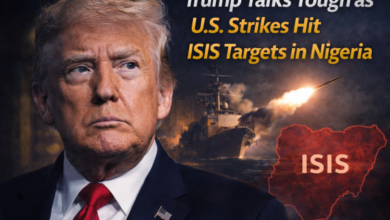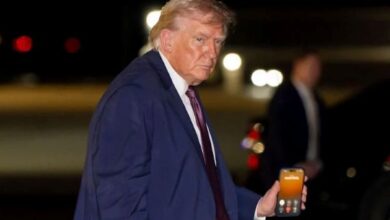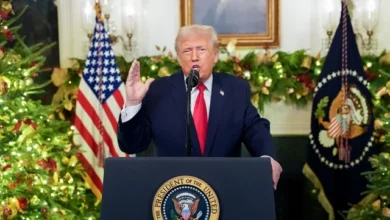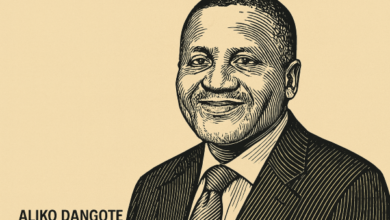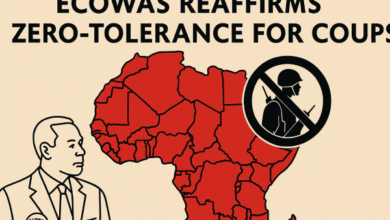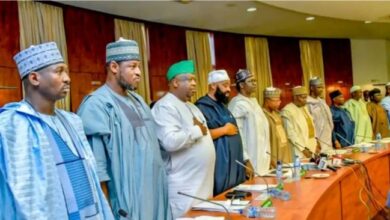Shettima: The Villa, the Veep, & the vicious rumour mill

By Musa Ahmed
In the volatile landscape of Nigerian politics, whispers often travel faster than facts—and sometimes, they evolve into full-blown fairy tales. The most recent? That Vice President Kashim Shettima was allegedly barred—yes, barred—from entering the Presidential Villa by armed military units.
It is the kind of outlandish fiction that could only be born from either the fertile imagination of political mischief-makers or the fringes of disinformation mills designed to sow discord at the heart of the Nigerian presidency. Fortunately, the Vice President’s spokesperson, Mr. Stanley Nkwocha, wasted no time in putting this rumour where it rightly belongs—on the scrapheap of deliberate falsehoods.
Setting the Record Straight
“The publication,” Nkwocha asserted in a strongly worded statement from Abuja, “was a story so far removed from reality.” He described the tale as not only “malicious,” but as part of a “deliberate and well-planned orchestration of falsehood against the Vice President’s person and office.”
Let’s pause here. This isn’t just a rebuttal of another piece of fake news—it’s a window into the growing pattern of digital guerrilla tactics being employed to stoke suspicion, cause confusion, and chip away at public trust in the Tinubu-Shettima administration.
Why Now? Why This?
Why would such a rumour emerge at this time? The answer, seasoned observers would argue, lies in the evolving political dynamics and the tightening screws of governance reforms. With President Bola Ahmed Tinubu’s administration navigating sensitive terrain—fuel subsidy removal, naira stabilization, civil service reforms, and the drive for CNG adoption—any perceived crack at the top could provide fertile ground for those angling for relevance or revenge.
It is no coincidence that this fake narrative comes on the heels of other mischievous claims, such as the phantom presidential campaign posters featuring Tinubu and allegedly orchestrated without approval. These fabrications follow a curious pattern: create the illusion of chaos, frame the leadership as divided, and watch the misinformation spread like wildfire across low-credibility platforms.
But as Nkwocha aptly put it, this latest “publication by some obscure blogs… is not only the wildest expression of wishful thinking, it’s a clear indication that the purveyors of these tales have exhausted both ink and imagination.”
Reading Between the Lines
In truth, no such security drama occurred. The Vice President continues to perform his duties unfettered—strategizing on economic revitalization, representing Nigeria at international fora, and chairing critical development councils. The Villa, as insiders confirm, remains a functional and cohesive center of governance.
Still, the broader issue lingers: Nigeria’s public discourse remains dangerously vulnerable to manufactured narratives. In an era of virality, where anonymous blogs and manipulated social media accounts pose as “sources,” even the most outlandish story can command attention before fact-checkers catch up.
This is not merely a public relations challenge for government communicators; it is a threat to national stability. As Nkwocha wisely noted, “These reports seek to mislead the public into believing there’s discord at the highest levels of government.”
The Business of Truth in an Age of Spin
For concerned Nigerians, whose focus is not just on commerce and policy but the brands of leadership and governance, this incident is a stark reminder: perception is currency. The credibility of a government—like that of a multinational or bank—can be undermined not by what it does, but by what it’s perceived to do.
This is why strategic communication must be swift, firm, and proactive. The Vice President’s media office did just that—squashing rumour with fact, not fury. Yet, beyond this response lies a bigger challenge: cultivating a citizenry that can distinguish gossip from governance.
In an information economy riddled with distortions, truth itself must become a brand worth defending.
The Final Word
Vice President Shettima remains, as ever, focused on his mandate—supporting the President in building a Nigeria that works for all. He is not indulging in any political media circus, nor is he distracted by whispers designed to conjure smoke where there is no fire.
Nigerians, too, must not allow themselves to be pawns in games played by faceless instigators. As Nkwocha so pointedly put it, “No amount of falsehood or manufactured tension can shake the foundation of that democratic mandate. Not under the watch of President Tinubu.”
And not under the eye of a vigilant public.







